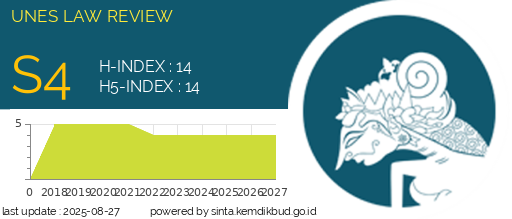Pelaksanaan Pembinaan Terhadap Narapidana dengan Perilaku Seksual Menyimpang di Lapas Perempuan Kelas IIA Pekanbaru Dikaitkan dengan Kepastian Hukum
DOI:
https://doi.org/10.31933/unesrev.v6i1.993Keywords:
Construction Implementation, Perverted sexual, Prisoner, Legal CertaintyAbstract
Sexual deviance can be interpreted as everything related to sexual deviance, both in terms of orientation, interest, and surveillance to determine sexual attitudes. By not fulfilling the biological needs of female convicts, a lot of deviant sexual behavior occurs in the Class IIA Pekanbaru Women's Penitentiary. In order to fulfill their biological needs, prisoners are no longer ashamed to do things that are not common in prison. So it is necessary to make efforts to prevent deviant behavior in prisons. The formulation of the problem in this study is: 1. How is the implementation of coaching for convicts with deviant sexual behavior at the Class IIA Pekanbaru Women's Prison related to legal certainty? 2. What are the factors that cause deviant sexual behavior in Class IIA Women's Prison Pekanbaru? 3. What are the obstacles in fostering convicts with deviant sexual behavior at the Class IIA Pekanbaru women's prison? This research is a legal research that is descriptive in nature with an empirical juridical approach. The data used are primary data and secondary data. Data were collected through interviews, observation, and literature studies to then be processed and analyzed descriptively. From the results of the research and discussion, the results show that: 1. The development program is religious development, personality development and independence development are coaching programs that prioritize primary prevention strategy models. 2. Factors of same-sex relations in Class IIA Pekanbaru Women's Prison; Weak knowledge of religion, because of consensual feelings, because of the trauma of being hurt by men, because of environmental factors, abnormal sexual orientation naturally. 3. Obstacles in coaching are; There are no regulations governing, a lack of human resources for prison officers, a lack of interest in prisoners in the coaching process, a lack of facilities and infrastructure for Class IIA Pekanbaru Women's Prison.
Downloads
References
Bachtiar Agus Salim. (2003). Tujuan Pidana Penjara Sejak Reglemen 1917 Hingga Lahirnya Sistem Pemasyarakatan di Indonesia Dewasa ini. Medan: Pustaka Bangsa.
Fadillah Sabri. (2012). Pengaturan Tindak Pidana Perzinahan Berdasarkan Hukum Pidana Islam dalam Rancangan KUHP. Delicti 10 (1); 37.48.
Ismal Pettanase. 2019. Pembinaan Narapidana Dalam Sistem Pemasyarakatan, Jurnal Hukum. 1(17); 67-88.
Romli Atmasasmita. (1982). Strategi Pembinaan Pelanggaraan Hukum Dalam Konteks Penegakan Hukum Di Indonesia. Bandung: Alumni.
__________. (1995). Kapita Selekta Hukum Pidana dan Kriminologi. Jakarta: Mandar Maju.
Sudarto. (1974). Suatu Dilema dalam Pembaruan Sistem Pidana Indonesia. Semarang: Pusat Studi Hukum dan Masyarakat.
Umi Enggarsasi. 2013. Pola Pembinaan Narapidana dalam Memberikan Kontribusi Kebershasilan Pembinaan Narapidana di Indonesia. Jakarta: Raja Grafindo.
Keputusan Menteri Kehakiman Republik Indonesia Nomor: M.02-PK.04.10 Tahun 1990 Tentang Pola Pembinaan Narapidana dan Tahanan
Peraturan Perintah Republik Indonesia Nomor 31 Tahun 1999 Tentang Pembinaan dan Pembimbingan Warga Binaan Pemasyarakatan
Undang-Undang Dasar Negara Republik Indonesia Tahun1945
Undang-Undang No 1 Tahun 1946 tentang Kitab Undang-Undang Hukum Pidana
Undang-Undang No. 12 Tahun 1995 tentang Pemasyarakatan
Downloads
Published
How to Cite
Issue
Section
License
Hak cipta :
Penulis yang mempublikasikan manuskripnya di jurnal ini menyetujui ketentuan berikut:
- Hak cipta pada setiap artikel adalah milik penulis.
- Penulis mengakui bahwa UNES Law Review berhak menjadi yang pertama menerbitkan dengan lisensi Creative Commons Attribution 4.0 International (Attribution 4.0 International CC BY 4.0) .
- Penulis dapat mengirimkan artikel secara terpisah, mengatur distribusi non-eksklusif manuskrip yang telah diterbitkan dalam jurnal ini ke versi lain (misalnya, dikirim ke repositori institusi penulis, publikasi ke dalam buku, dll.), dengan mengakui bahwa manuskrip telah diterbitkan pertama kali di Jurnal UNES Law Review.



















